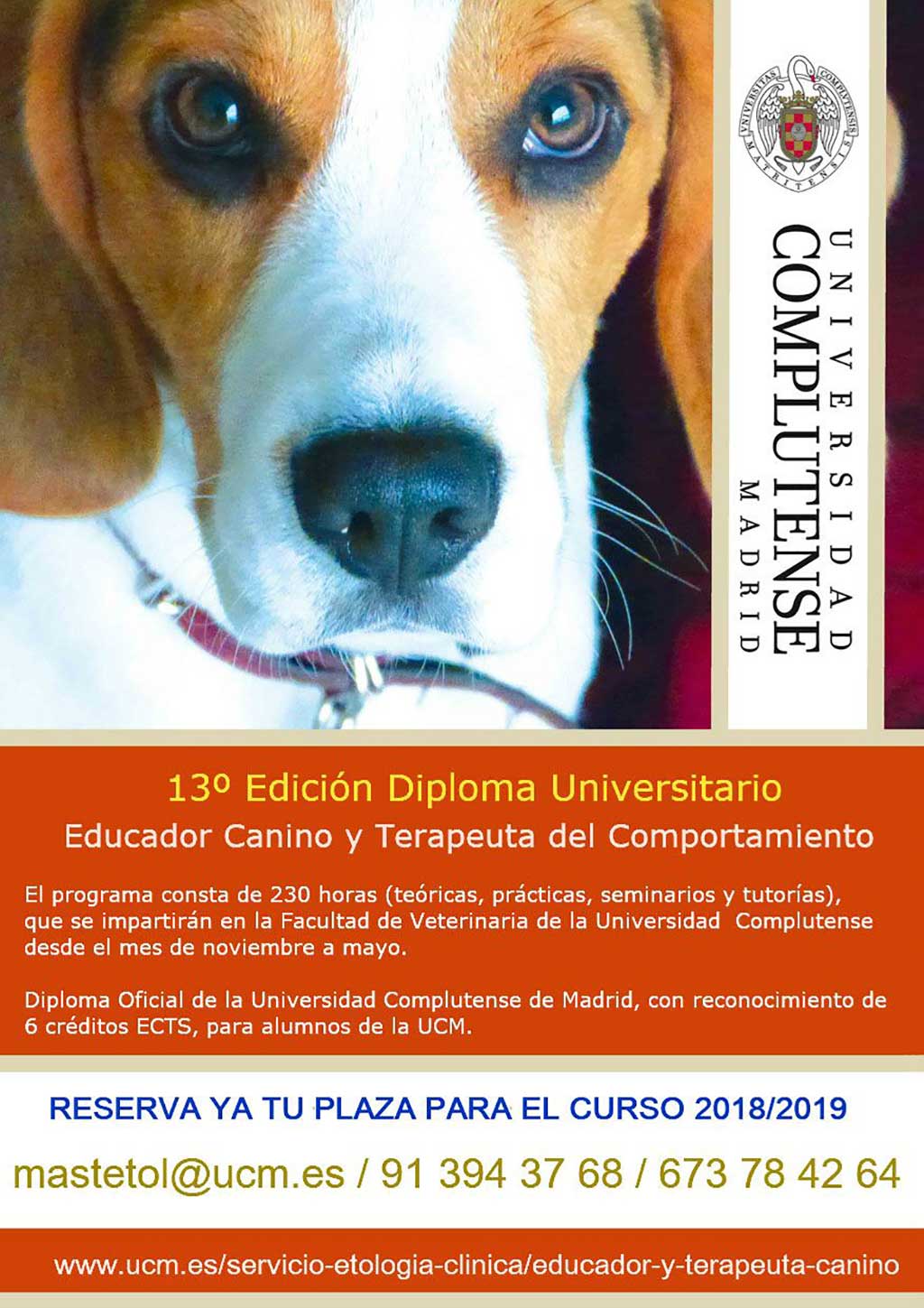Canine Educator Diploma and Behavior Therapist of the UCM
Continuing Education of the UCM organized by the Department of Animal Production of the Faculty of Veterinary

Collaborate: Public and private entities, specialized in education and canine training (Guardia Civil, Madrid City Council, ONCE).
Directed to: The training of professionals such as canine educators and behavior therapists, whose competences and responsibilities respond to the needs and interests demanded by society based on the current situation of behavioral problems and the needs of social welfare and development of behavioral sciences.
Requirements: Proof of university entrance or equivalent, or accredited professional experience (the latter requires exceptional authorization).
OBJECTIVES [19659007] Be familiar with the anatomical and physiological aspects of the endocri system no and of the central nervous system, associated with behavior.
Having a good knowledge of typical dog behaviors, learning development and motivational influence.
Be familiar with the most important types of behavioral problems. and with the basic principles of behavior modification.
Apply educational and training methods, correct and sufficient, that allow mutual coexistence between animals and human beings.
Be informed of public interest behavior issues. , Including animal control, animal management, animal needs and rights (animal welfare) and animal regulation laws proposed and approved at European, national, regional and local levels.
PROGRAM DEVELOPMENT of the Educator Course Canine and Behavioral Therapist of the UCM
The program will be developed throughout the months of October to May, with a total of 230 hours, of which: 75 hours are theoretical and the rest will be face-to-face practical classes with dog and personal work, in order to complete the practical training of the course, consisting of: practices with extramural dog, preparation and preparation of seminars and self-evaluations with video.
The work done to prepare the final report of the course and the tutorials is also considered. For the realization of this course it is essential to bring a dog to carry out the practical classes with dog.
The contents of the program are structured in different modules, developing with the following schedule:
Theoretical and practical classes: Monday to Wednesday, from 5:00 p.m. at 20:00 h
PLACE OF REALIZATION
The theoretical classes will be taught at the Faculty of Veterinary Medicine of Madrid, UCM and the practical classes will be taught at the Faculty of Veterinary Medicine and at collaborating public and private centers. 19659006] CONTENT OF THE PROGRAM Canine Educator Course and Behavior Therapist of the UCM
MODULE I: Anatomy and physiology
Anatomy of the Nervous System
Physiology of the Nervous System
MODULE II: Ethnology and Genetics
Genetics and behavior
Ethnological bases; External morphology
MODULE III: Animal Learning and Legislation
Motivation, emotion and instinct
Animal Learning and Behavior Modification Techniques
Environmental Enrichment in Canids
Animal Communication
Role of the Educator and the importance of the physical preparation of the educator and the dog
Legislation. Potentially dangerous dogs
MODULE IV: Animal behavior
Introduction to Ethology
Domestication and animal man relationships
Behavior development
Study of dog behavior
Dog social behavior and communication
Main behavioral alterations
Clinical cases exhibition
MODULE V: Practices
Puppy education
Basic principles of dog learning and education
Sports work (OCI, Agilit and , Cani cross, Flyball, Canine skills …)
Practical application of the rescue dog and civil protection
The assistance dog for the disabled.
The guide dog for the blind. Assisted therapy with animals
The dog of security, defense and combat
Therapies of behavior modification
Other articles recommended by doogweb …
